Genre et inclusion
Au fur et à mesure que les transferts monétaires continuent à se développer, les parties prenantes demandent une meilleure prise en compte des problématiques de genre et d’inclusion car « des transferts monétaires sensibles au genre qui tiennent compte des disparités et répondent équitablement aux besoins de toutes les personnes affectées par une crise ont le potentiel d’avoir un impact positif sur les femmes et les filles en les protégeant davantage et en favorisant leur autonomisation, tout en renforçant les impacts spécifiques au secteur, qui peuvent rendre les ménages et les communautés ayant vécu une crise plus résilient·es et plus autonomes. » (Directives pour le chantier du Grand Bargain sur les transferts monétaires et le genre). La pandémie de COVID-19 a accru l’urgence de l’assistance car elle a affecté les femmes et les groupes exclus en particulier en augmentant la charge de travail de soin, en réduisant les opportunités d’emploi de manière disproportionnée et en exposant les femmes à des difficultés financières plus fortes et à davantage de violences basées sur le genre.
Le CALP Network continue d’ancrer son travail sur le symposium #GenreEtTransfertsMonétaires organisé en 2018 à Nairobi et sur l’engagement inscrit dans le programme pour l’action collective (Agenda for Collective Action) qui en a résulté. Le rapport « La situation mondiale des transferts monétaires en 2020 » fait état de progrès notables en matière de genre et de transferts monétaires, alors que ce domaine était marqué par des lacunes importantes en matière de données probantes dans le dernier rapport. De nouvelles directives ont été produites sur le genre et les transferts monétaires, ainsi que le genre et les VBG, et des efforts ont été réalisés en termes de synthèse et d’identification de données probantes plus rigoureuses. L’attention, portée initialement aux VBG, s’oriente désormais vers l’égalité entre les genres et l’adaptation de la programmation afin qu’elle ne tienne plus seulement compte du genre mais intègre cette problématique de manière transversale, et même transformatrice. Toutefois, bien que nous remarquions des progrès au niveau technique partout dans le monde, cela ne s’est pas traduit par des changements ancrés en termes de planification, de mise en œuvre et de suivi.
Priorités actuelles
Nous continuerons à travailler étroitement avec les responsables du chantier auxiliaire du Grand Bargain sur les transferts monétaires, CARE et ONU Femmes pour mettre en œuvre le plan de travail. Le CALP Network va continuer à encourager les acteurs de l’assistance monétaire à prendre en compte davantage de problématiques afin d’être plus inclusifs, et de favoriser une meilleure compréhension de la manière dont nous pourrions utiliser les transferts monétaires pour ne pas nous contenter de ne pas nuire mais aussi lutter contre ces inégalités socio-économiques par le biais de la prestation d’autres services et modalités de soutien.
Contenu associé

Collected Papers on Gender and Cash Transfer Programmes in Humanitarian Contexts
Report
Existing gender inequalities mean that disasters and conflicts impact women, men, girls and boys differently. Cash based assistance is one of the most significant developments in humanitarian assistance in recent years. But the relationship between gender and cash based assistance in humanitarian contexts is poorly understood. All too often, interventions are designed based on assumptions...

Guide for Protection in Cash based Interventions
Guidelines and Tools
This guide identifies minimum necessary information and key resources needed to help humanitarian practitioners ensure that protection risks and benefits are considered and monitored throughout the cash-based interventions (CBI) program cycle, using a community-based approach and participatory methods as much as possible. It can help to inform CBI in any program context: protection...

Microlearning video: CVA and Gender
Blog Post
This video provides an overview of the relationship between gender and cash and voucher assistance (CVA) structured around the humanitarian project cycle, which include: Assessment and response analysis: How to adjust the assessment processes to achieve a more accurate reflection of gender and markets. Design and implementation: How to use methods and protocols to reduce the potential...

Better Gender Outcomes in Food Assistance through Complementary and Multi-Modal Programing: Promising Practices Tip Sheet
Guidelines and Tools
This Tip Sheet is excerpted from the research report, “Better Gender Outcomes in Food Assistance through Complementary and Multi-Modal programming,” and gives promising practices by the cycles of project cycle management, as well as at the response level. Additionally, there are expert tips and wisdom practices that support the use of a gendered approach in development or humanitarian...

Cash & Voucher Assistance and Gender-Based Violence Compendium
Guidelines and Tools
The Compendium is intended as a companion to the 2015 Inter-Agency Standing Committee (IASC) Guidelines for Integrating Gender-Based Violence Interventions in Humanitarian Action and its companion resource, the GBV Pocket Guide. The guidance was developed through the efforts of 15 organizations who contributed expertise in the inception, design and review of the document. The process was led...

Cash and Voucher Assistance that Works for Women: 6 lessons from the field
Report
Building on CARE’s commitment to be ‘cash ready’ to achieve breakthroughs with and for women and girl, CARE commissioned a study –in Malawi, Haiti, Jordan, the Philippines and Niger–on gender-sensitive CVA that allowed actual CVA recipients to frame the discussion. This is a brief from the research “What Does Gender-Sensitive Cash and Voucher Assistance Look Like?” and presents...
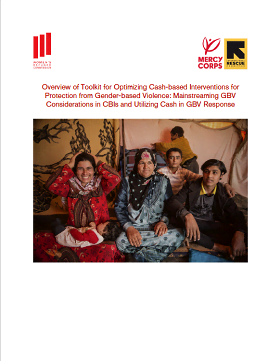
Toolkit for Optimizing Cash-based Interventions for Protection from Gender-based Violence
Guidelines and Tools
Efforts to prevent and respond to GBV should be a priority for all actors in all humanitarian response operations from the very start. By mainstreaming GBV considerations in CBIs throughout the program cycle and by utilizing cash within GBV case management services, cash can be optimized as a tool to enhance the protection of crisis- and conflict-affected populations and to mitigate risks of...
Thematic lead
Contenu récent

Leveraging Cash and Voucher Assistance in Gender-based Violence Prevention and Response
Blog Post
Despite a reported 60% scale-up in cash and voucher delivery from 2016-18, its use for protection outcomes – including to support the prevention of and response to gender-based violence – trails behind that of all other sectors. In our latest guest blog, Tenzin Manell of Women’s Refugee Commission...

How Cash-Based Approaches affect Nutrition Outcomes: Case Studies from World Vision cash programmes in Bangladesh and South Sudan
Report
Case studies South Sudan & Bangladesh – analysis of how different modalities meet their basic needs with flexibility and dignity, esp. contributing to improved nutrition outcomes. Factors such as spending patterns, availability of nutritious food in markets, dietary changes & coping strategies, transfer...

How Cash-Based Approaches Affect Nutrition Outcomes – Guidence Note
Guidelines and Tools
Based on the case studies from South Sudan and Bangladesh, this summary guidance provides advise on use of CVA for improved nutrition outcomes in vulnerable children, emphasising recommendations to ensure that:
– as part of design and targeting, there is improved consideration of nutrition needs in MEB...
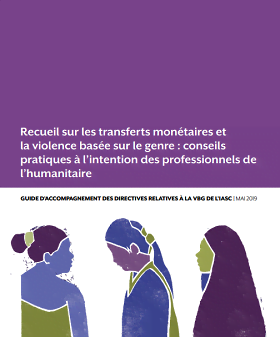
Recueil sur les transferts monétaires et la violence basée sur le genre : conseils pratiques à l’intention des professionnels de l’humanitaire
Guides et outils
Ce recueil de conseils pratiques sur les transferts monétaires (TM) et la violence basée sur le genre (VBG) a pour objectif d’aider les acteurs humanitaires et les communautés touchées par des crises et des conflits à: intégrer l’atténuation des risques de VBG dans les interventions...
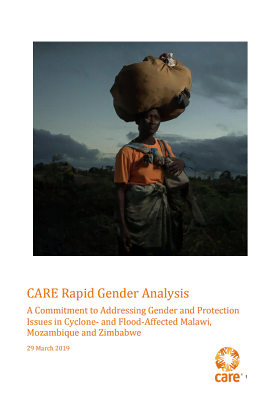
CARE Rapid Gender Analysis – A Commitment to Addressing Gender and Protection Issues in Cyclone – and Flood – Affected Malawi, Mozambique and Zimbabwe
Report
CARE International is responding to the impact of Cyclone Idai and the associated floods in Malawi, Mozambique and Zimbabwe. As part of our response, CARE’s team in each of the countries is currently developing or is planning to develop a Rapid Gender Analysis (RGA) for the affected regions. An RGA...

#GenderCash: One year on from the Nairobi Gender Symposium
Blog Post
Together our members and partners have strengthened the evidence base and advanced the debate around gender and cash and voucher assistance. Looking ahead, how can we ensure we turn talk into action to deliver quality CVA for everyone?

The UN Common Cash Platform: What does it mean and how is the IRC responding?
Blog Post
Together our members and partners have strengthened the evidence base and advanced the debate around gender and cash and voucher assistance. Looking ahead, how can we ensure we turn talk into action to deliver quality CVA for everyone?
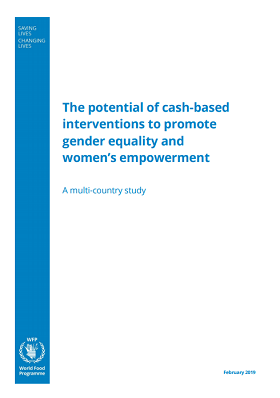
The Potential of Cash-Based Interventions to Promote Gender Equality and Women’s Empowerment
Report
The study on The Potential of Cash-Based Interventions to Promote Gender Equality and Women’s Empowerment sought to explore how CBIs can contribute to achieving gender equality and women’s empowerment (GEWE), as ends in themselves and for food security and nutrition outcomes. Where changes in GEWE...
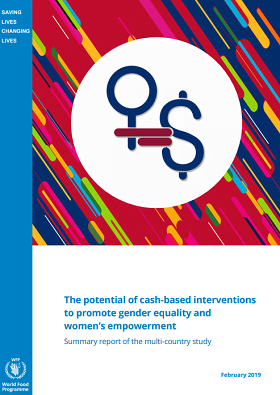
The Potential of Cash-Based Interventions to Promote Gender Equality and Women’s Empowerment – Summary Report of the Multi-Country Study
Report
The study on The Potential of Cash-Based Interventions to Promote Gender Equality and Women’s Empowerment sought to explore how CBIs can contribute to achieving gender equality and women’s empowerment (GEWE), as ends in themselves and for food security and nutrition outcomes. Where changes in GEWE...
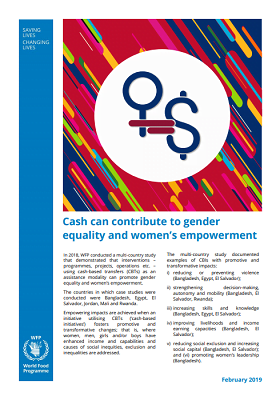
Cash Can Contribute to Gender Equality and Women’s Empowerment
Report
In 2018, WFP conducted a multi-country study that demonstrated that interventions – programmes, projects, operations etc. – using cash-based transfers (CBTs) as an assistance modality can promote gender equality and women’s empowerment. The countries in which case studies were conducted were...

Introductory Research on the Feasibility of Cash and Voucher Assistance in Rural Fiji
Report
This report presents the findings of a study into the general feasibility of using Cash and Voucher Assistance (CVA) in responding to disasters in Fiji. The term “Cash and Voucher Assistance” or CVA, is used in the report in line with the the CALP Network definition, so it refers to programs where...

Guide to Cash and Voucher Assistance and Gender-based Violence Resources
Guidelines and Tools
This one-page guide helps practitioners understand how three complementary resources support the integration of CVA and GBV prevention, mitigation and response to strengthen humanitarian response. It aims to help users make decisions on when to use each resource at different stages of work and compares:

Feasibility Study on Cash Transfer Programming for the Returnees and the Host Communities in Gedeo and West Guji in Ethiopia
Report
This document reveals the outcome of a feasibility study on cash transfer programming targeted for the returnees and the host communities in Gedeo and West Guji Zones.
The major objectives of the study were as follows:
1. Understand general cash transfer environment in Ethiopia
2. Validate the needs of...

The potential of Cash and Voucher Assistance to empower women and reduce violence evidence
Report
On April 29 and 30th in Washington DC, CARE and UNWOMEN, on behalf of the gender and cash sub-workstream of the Grand Bargain, convened a workshop with the objectives of:
• Sharing and exchanging existing knowledge, experiences, and good practices;
• Exploring and prioritizing research gaps on cash...

The Digital Lives of Refugees: How displaced populations use mobile phones and what gets in the way
Report
GSMA in partnership with UNHCR conducted quantitative surveys and qualitative research to understand the ways in which refugees are using mobile phones in order to help guide digital interventions by humanitarian organisations and mobile network operators. The research identifies key trends, statistics,...

Can cash transfers in humanitarian contexts help prevent, mitigate, and respond to gender-based violence? A review of the evidence
Report
Today, approximately 10 percent of humanitarian assistance globally is delivered via cash transfer programming (CTP) and cash is increasingly being scaled across the humanitarian system. Yet the use of cash within the protection sector trails behind the use of cash in all other sectors. Refugee and...

Minimum Expenditure Basket Harmonization Guidance
Guidelines and Tools
The present Minimum Expenditure (MEB) Guidance is an operational tool for the Refugee Response to inform humanitarian multi sector and/or multipurpose cash assistance to meet food needs and a broader set of essential needs of refugees in Uganda.

Bridging the Mobile Gender Gap for Refugees
Report
Mobile phones have become an increasingly powerful tool with which to deliver life-enhancing information, services, and opportunities to millions who have not been able to access them before. This case study analyses data from two refugee contexts in East Africa to understand the degree to which women are...
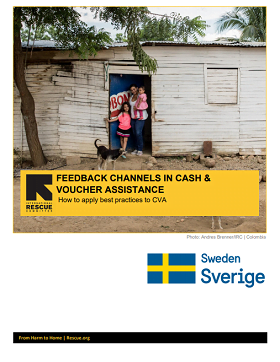
Feedback Channels in Cash and Voucher Assistance: How to Apply Best Practices to CVA
Guidelines and Tools
Accountability is at the core of effective humanitarian programming, and it is our duty to ensure that all programs – including those that use CVA to meet outcomes – are responsive to the clients we serve. While CVA is not inherently more risky than other forms of assistance, there are specific...

CVA for Protection: A Mapping of IRC’s Use of Cash and Voucher Assistance to Help Achieve Protection Outcomes
Guidelines and Tools
The IRC first began to integrate cash into protection programs in 2013, leveraging the flexibility of CVA to support clients living in urban refugee contexts in the Middle East. Since then, IRC has rapidly expanded its use of CVA to help achieve protection outcomes. This scale-up has come with important...




